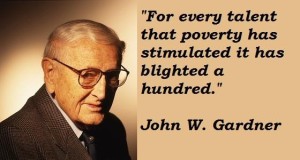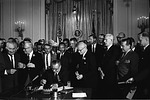Is it fair to have said in 1983, and to say now, that we are a nation at risk? My gut tells me yes, forever and always, we should be viewing this republic in that light lest we become complacent. Wait! Too late? … Not really.
The words “rising tide of mediocrity” from Ronald Reagan’s National Commission on Excellence in Education report, titled “A Nation at Risk,” lives in infamy to stir a divisive debate. Were those words a fair assessment?
To decide, I reviewed the 11 statistical indicators used by the commission but then I got to thinking; education reports of any true significance to long-term progress (which is what should be part of our concern) tend to run a decade or so behind any given change. And that is when it dawned on me to ask my fellow 1974 graduates what they thought of the education we received in our small, mid-western, blue-collar town.
I posted this on Facebook: “Albion High School (AHS) Graduates: how would you describe our education at AHS? Great/Mediocre/Poor?” Was this scientific? No. Is it significant? You decide.
Those that responded overwhelmingly judged their education in the late 60’s and early 70’s as mediocre leaning towards poor. Was it a “rising tide”? I don’t know. But what I do know is, as expressed in the responses by those that had gone to other schools, our school was “not as challenging as the other schools. I couldn’t believe the difference!”
This was unequal access; it existed then, it exists now.

John W. Gardner, an influential Republican who served both parties and helped bring to fruition a federal education law under a Democrat’s administration.
However, if you read down through the responses from my wise classmates, you’ll find that they/we were not fully crippled by the mediocrity of our educational background and we recognize that it took concerted individual effort to overcome the shortcomings of our formal education. Some acknowledged what a privilege it was to come from families that had and valued books and many of those that responded were, one way or another, able to pursue higher education.
I was left wondering about those that did not respond. Did they find support and fill the educational gaps? Did they have talents they never developed to their full potential? How much American talent is lost when mediocre education is accepted anywhere?
How is this a fair shot?
And why are education pundits, bloggers, leaders, etc. still blaming a report for the take-over of education reform by the education industry? Is that a fair assessment? More importantly, wouldn’t it be in the best interest of children for us to look at and reevaluate our history of education reforms in a positive light?
Take the good; leave the bad behind. Change; improve; make progress!

